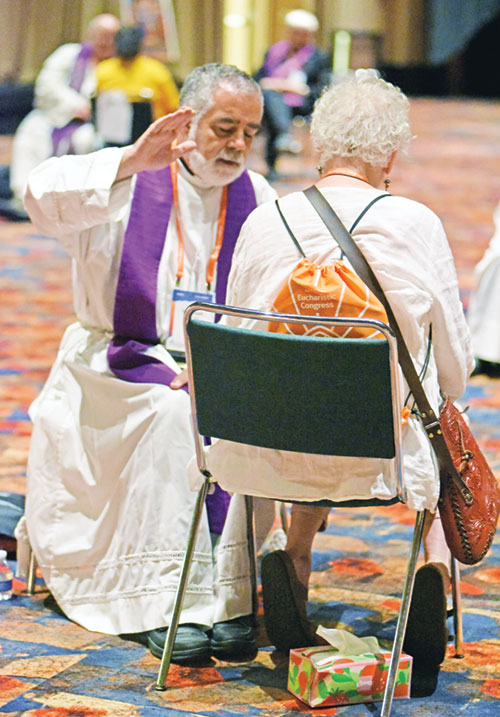Priests and penitents find peace in God’s mercy in confession at congress

Father Joseph Moriarty gives absolution on July 17 in the sacrament of penance to a penitent attending the National Eucharistic Congress at the Indiana Convention Center in Indianapolis. (Photo by Sean Gallagher)
By Sean Gallagher
Father Joseph Moriarty is used to hearing confessions at events where large numbers of Catholics gather.
The National Catholic Youth Conference has drawn as many as 20,000 Catholic teens and chaperones to Indianapolis every other year for more than a decade. He’s also heard confessions many times at the National March for Life in Washington.
And as a missionary of mercy appointed by Pope Francis during the Year of Mercy in 2016—an appointment that was extended indefinitely after the special jubilee year—Father Moriarty sees the sacrament of penance as a central part of his priestly life and ministry.
Sometimes at large events, he and dozens of other priests might be available at the same time and in the same room for the sacrament of penance for several hours, with a steady flow of penitents coming through.
It can be hard for Father Moriarty. “You’re completely emotionally exhausted,” he said, before quickly adding, “but there’s no other place I would desire to be in that moment because it is the work of God’s salvation.
“When I surrender that, I become an instrument in persona Christi. It’s not about me. It’s about what God does through me. And it’s happening throughout the entire room.”
Carrie Matadobra experienced what happened in a large ballroom in the Indiana Convention Center in Indianapolis that was turned into a confession area when she took part in the sacrament of reconciliation on July 17, the first day of the National Eucharistic Congress.
“I could really feel God’s peace in there,” said Matadobra, who, with her husband and two children, are members of St. Edward Parish in Shelton, Wash.
She thought going to confession on the first day of the congress was a good way to prepare herself for the blessings that were to come.
“God is faithful and just in forgiving us of our sins,” Matadobra said. “He cleanses us of all unrighteousness. In order to have a receptive ear, we need to be cleansed of our sins and everything in this world that separates us from him. It’s a good way to start off the congress. God is faithful.”
Like Father Moriarty, Paulist Father Bruce Nieli of Austin, Texas, is a missionary of mercy who has heard confession at many large Catholic events, including several World Youth Days.
Hearing confessions for several hours at a time in places around the world with a long and steady stream of penitents has made one message clear to Father Nieli.
“It shows me the hunger that people have all over the world for inner peace, for assurance of forgiveness, for affirmation and for just getting on with life,” he said. “It’s a universal desire for inner reconciliation and peace.”
David Mueller, a member of St. Vincent de Paul Parish in Cape Girardeau, Mo., experienced that hunger himself when he went to the confession room on July 19.
“There’s a yearning to answer to your conscience,” he said. “When people actually take the time to examine it, … they see it as the core of their being. They want to make themselves better, in a sense.”
The universality of that hunger was on display at the congress as priests were available to hear confessions in several languages.
Sister Maria Fatima Numes, a member of the Dominican Sister of Mary Mother of the Eucharist, assisted in the confession room during the congress.
But given how large the convention center is, she knew that there were probably many people who wanted to experience God’s mercy in the sacrament, but didn’t know where to go for it.
So, Sister Maria Fatima quickly made a sign that read, “Confession? Ask me where to go” and walked through the center’s cavernous hallways and exhibit halls.
“Confession is my absolute favorite sacrament,” she said. “I love the sacrament of confession.”
That might be surprising coming from a member of a religious order dedicated to Mary Mother of the Eucharist.
But Sister Maria Fatima knows from personal experience that the sacrament of reconciliation “leads us to be open to receive the graces of the Eucharist.”
“I’ve had beautiful encounters with God’s mercy in the tribunal of mercy [confession]. One of my greatest joys is, as a teacher and sister, to encourage people to go to confession and to lay it all at the feet of Jesus.
“I personally know how hard it can be to bring the big stuff before the Lord. So, I love to encourage people not to be afraid to do that.”
While priests do many things at events like the eucharistic congress—from concelebrating Masses and distributing Communion, to sometimes giving presentations or leading parish or school groups, Father Moriarty said all these pale in comparison to what they do in the sacrament of penance.
“I would dare say that this is the single most important thing a priest can do at those events,” he said, “because he is preparing God’s people to receive the Eucharist.” †
(See all of our coverage of the National Eucharistic Congress at www.archindy.org/congress.)
